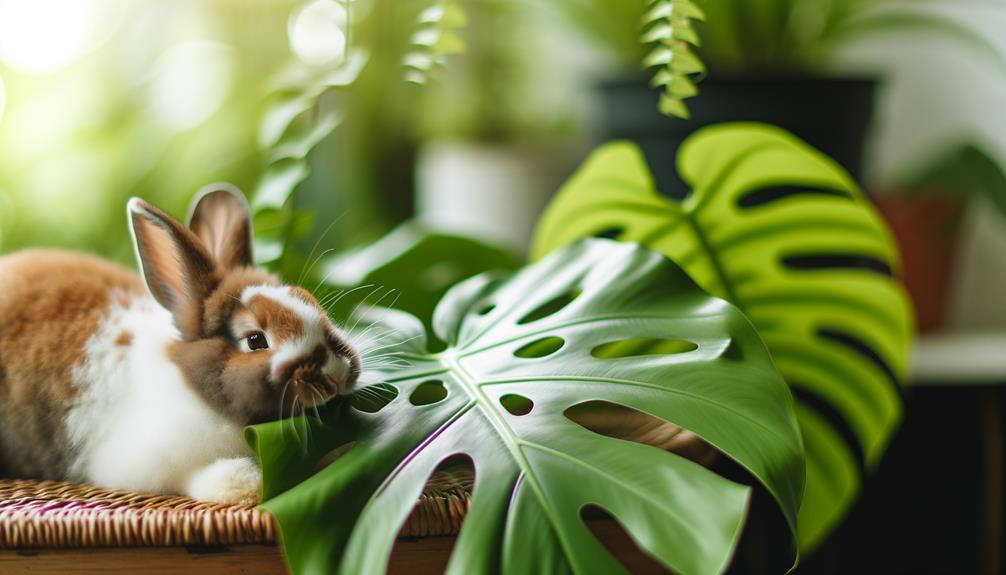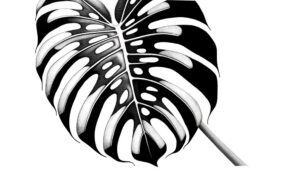Can Rabbits Eat Monstera Deliciosa? Important Information!
No, rabbits shouldn’t eat Monstera Deliciosa. This plant contains insoluble calcium oxalates that can cause severe oral irritation, gastrointestinal distress, and potentially lead to kidney damage and respiratory complications in rabbits.
Symptoms of poisoning include drooling, mouth swelling, vomiting, diarrhea, and difficulty breathing. If your rabbit ingests Monstera Deliciosa, promptly remove the plant material, rinse your rabbit’s mouth, and contact a veterinarian.
Prevent access by removing the plant from your home or placing barriers around it. Providing safe, non-toxic plants and chew toys can help keep your rabbit healthy.
Discover additional safety steps below.

Key Takeaways
- Monstera Deliciosa is toxic to rabbits due to its insoluble calcium oxalates.
- Ingestion of Monstera Deliciosa can cause oral irritation and gastrointestinal distress in rabbits.
- Symptoms of poisoning include vomiting, diarrhea, drooling, and mouth swelling.
- If a rabbit ingests Monstera Deliciosa, contact a veterinarian immediately.
- Remove Monstera Deliciosa from areas accessible to rabbits to prevent exposure.
Understanding Monstera Deliciosa
Monstera Deliciosa, commonly known as the Swiss Cheese Plant, is native to tropical forests and is prized for its large, fenestrated leaves. You’ll find it often used as an ornamental plant due to its unique visual appeal and ease of care.
This plant thrives in indirect sunlight and high humidity, which mimics its natural habitat. Scientifically, Monstera Deliciosa belongs to the Araceae family and exhibits rapid growth under ideal conditions. Its leaves can reach up to three feet in length, contributing to its dramatic appearance.
Understanding the plant’s ecological and botanical characteristics is essential if you’re considering its interaction with other organisms, such as pets. This foundational knowledge helps in making informed decisions regarding its care and placement.
Toxicity of Monstera Deliciosa
Despite its popularity as a houseplant, the Swiss Cheese Plant contains insoluble calcium oxalates that can pose serious health risks to rabbits. These needle-shaped crystals can cause significant irritation and damage when ingested.
When considering the safety of your rabbit, you must understand the following risks:
- Oral irritation: Sharp crystals can cause severe pain and swelling in the mouth and throat.
- Gastrointestinal distress: Ingestion can lead to vomiting, diarrhea, and abdominal pain.
- Kidney damage: Chronic exposure may contribute to kidney stones or other renal issues.
- Respiratory complications: Swelling can potentially obstruct airways, causing breathing difficulties.
Given these significant health hazards, keeping Monstera Deliciosa away from your rabbit is vital to guarantee its well-being.
Symptoms of Poisoning
When a rabbit ingests Monstera Deliciosa, you’ll notice symptoms like gastrointestinal distress, including diarrhea and vomiting.
Oral irritation is also common, presenting as excessive drooling and difficulty swallowing.
Monitoring these signs can help you act quickly to seek veterinary care.
Gastrointestinal Distress Signs
If your rabbit ingests Monstera deliciosa, you may notice symptoms of gastrointestinal distress such as vomiting, diarrhea, and loss of appetite. These symptoms indicate that the plant’s toxic compounds are affecting your rabbit’s digestive system and can lead to severe complications if untreated.
It’s vital to monitor your rabbit closely for these signs:
- Vomiting: Frequent or persistent, indicating severe irritation.
- Diarrhea: Watery stools that can lead to dehydration.
- Loss of Appetite: Reduced food intake or complete refusal to eat.
- Lethargy: A noticeable decrease in activity levels.
Prompt veterinary intervention is essential to mitigate these symptoms and prevent further health decline. Understanding these signs will help you take immediate action to protect your rabbit’s well-being.
Oral Irritation Symptoms
In addition to gastrointestinal distress, rabbits that ingest Monstera deliciosa often experience oral irritation, characterized by symptoms such as drooling, swelling of the mouth, and difficulty swallowing. These symptoms arise from calcium oxalate crystals in the plant, which embed in the oral mucosa, leading to these clinical signs.
| Symptom | Description |
|---|---|
| Drooling | Excessive saliva production |
| Mouth Swelling | Inflammation of oral tissues |
| Difficulty Swallowing | Pain and discomfort during ingestion |
| Oral Lesions | Visible sores within the mouth |
| Pawing at Mouth | Rabbit’s attempt to alleviate discomfort |
Recognizing these symptoms early is vital. Immediate veterinary intervention can mitigate severe complications. Always monitor your rabbit’s environment to prevent accidental ingestion of toxic plants.
Safe Plants for Rabbits
You should focus on providing your rabbit with non-toxic edible plants such as basil, parsley, and cilantro. These nutrient-rich green options offer essential vitamins and minerals that support their overall health.
Safe herbal choices can also enhance their diet and prevent potential poisoning.
Non-Toxic Edible Plants
Many edible plants are safe and non-toxic for rabbits, providing important nutrients and variety in their diet. When selecting plants for your rabbit, focus on those known for their safety and nutritional value.
- Basil: Rich in antioxidants and vitamins, basil can support your rabbit’s health.
- Dandelion Greens: These are full of fiber and vitamins, promoting digestive health.
- Mint: Mint can aid in digestion, providing a revitalizing option.
- Rosemary: This herb offers anti-inflammatory properties and is safe in moderation.
It’s essential to ensure these plants are pesticide-free and introduced gradually to prevent digestive upset. Regularly incorporating a variety of non-toxic plants can enhance your rabbit’s overall well-being and dietary satisfaction.
Nutrient-Rich Green Options
Choosing nutrient-rich green options secures your rabbit receives crucial vitamins and minerals for peak health. Not all greens are created equal; some provide a superior nutrient profile, safeguarding your rabbit thrives.
| Plant | Nutrient Benefits | Emotional Impact |
|---|---|---|
| Kale | Rich in Vitamin A, C, and K | Promotes vitality |
| Romaine Lettuce | High in fiber and water content | Enhances hydration |
| Dandelion Greens | Packed with calcium and iron | Supports strong bones |
| Spinach | Abundant in antioxidants | Boosts immunity |
| Basil | Contains essential oils | Improves digestion |
Incorporating these greens into your rabbit’s diet not only meets their nutritional needs but also fosters a happier, more energetic pet. Avoid overfeeding any single type of green to maintain a balanced diet.
Safe Herbal Choices
Several safe herbal choices can enhance your rabbit’s diet while providing essential nutrients and fostering overall well-being. Evidence suggests that incorporating these herbs can support digestion, immune function, and dental health.
Consider the following options:
- Basil: Rich in vitamins A and K, it can boost your rabbit’s immune system.
- Cilantro: Offers a good source of antioxidants and aids in digestion.
- Mint: Helps with gastrointestinal issues and provides a revitalizing flavor.
- Parsley: High in vitamin C and calcium, it supports bone health and overall healthiness.
These herbs should be given in moderation, complementing a balanced diet of hay and fresh vegetables. Always introduce new foods gradually to monitor any adverse reactions.
Emergency Steps
If your rabbit has ingested Monstera Deliciosa, immediately remove any remaining plant material from its vicinity and contact your veterinarian. Symptoms of toxicity include drooling, difficulty swallowing, and oral irritation. Quick action can mitigate the effects of the plant’s insoluble calcium oxalates.
| Symptom | Action |
|---|---|
| Drooling | Rinse rabbit’s mouth gently |
| Difficulty swallowing | Keep rabbit hydrated |
| Oral irritation | Avoid feeding until advised |
Ensure you provide your vet with details about the ingestion, including the amount consumed and observed symptoms. Your vet may recommend bringing your rabbit in for further examination and treatment, which could include administering fluids and anti-inflammatory medications. Acting swiftly is vital to your rabbit’s recovery and well-being.
Preventive Measures
Preventive measures are crucial to safeguard your rabbit from ingesting potentially harmful plants like Monstera Deliciosa.
To effectively protect your pet, consider the following strategies:
- Remove Indoor Plants: Eliminate toxic plants from your home environment, focusing on spaces accessible to your rabbit.
- Enclosure Safety: Use rabbit-proof barriers around plants to prevent accidental ingestion.
- Provide Safe Alternatives: Supply your rabbit with safe, non-toxic plants and chew toys to reduce curiosity about harmful plants.
- Educate Household Members: Ensure everyone in your home knows which plants are harmful to rabbits, reinforcing consistent preventive practices.
Conclusion
Coincidentally, while you might admire the beauty of Monstera deliciosa, it’s harmful for your rabbit. Its toxicity can cause severe symptoms, making it vital to avoid.
Instead, consider offering safe alternatives like basil or timothy hay. If you suspect poisoning, act immediately and consult a vet. Preventive measures, such as keeping harmful plants out of reach, are necessary.
Informed choices secure your rabbit’s health and happiness, highlighting the significance of understanding plant toxicity.






